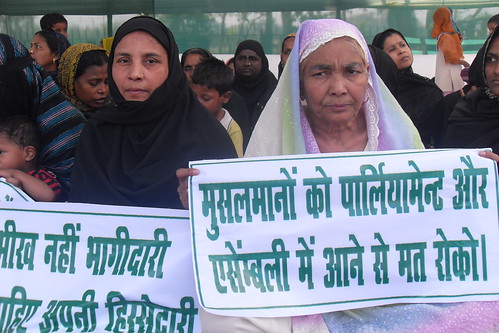By Mumtaz Alam Falahi, TwoCircles.net,
Patna: With likely expansion of the Union Cabinet in a week or so, the Muslim community leaders demand more representation of the community in the Prime Minister’s team. They also raise the bigger issues of quality representation and quota for the community in legislature.
Following Union Agriculture Minister Sharad Pawar’s request to PM to lessen his burden – he is holding the portfolios of agriculture, consumer affairs and food and public distribution – speculation is rife that the Central Ministry will be reshuffled and expanded. The place of Shashi Tharoor as Minister of State of External Affairs is also vacant since he resigned.

Muslims demanding reservation in Parliament and Assemblies in Patna [TCN photo: By Mudassir Rizwan]
There are currently only 5 Muslims – two of them from Congress – in the 81-member central ministry, thus the demand for more representation.
“Muslims should be given more representation in the PM’s team. It would be not right to demand representation in the cabinet according to the community population, but it should be such that the community should feel they are rightly represented,” says Dr Mohd Manzoor Alam, General Secretary, All India Milli Council, talking to TwoCircles.net on phone from New Delhi. He demands 2-3 more Muslim ministers. In total there should be at least 7-8 Muslim ministers, he adds.
There are 30 Muslim MPs in the present Lok Sabha, out of which 11 are from Congress. But the party inducted only two – Ghulam Nabi Azad and Salman Khurshid – in the Council of Ministers. In the Lok Sabha elections 2009, the Congress won 42 seats in districts with 25% or more minority voters, a four-fold increase. The party had fielded only 18 Muslims, and 11 of them were elected. But the Council of Ministers has just five Muslims – one less than in the previous UPA. Ghulam Nabi Azad of Congress and Farooq Abdullah of National Conference are cabinet ministers. Salman Khursheed of Congress is Minister of State with Independent Charge while E Ahamed of Muslim League and Sultan Ahmed of Trinamool Congress are Ministers of State.
Dr Manzoor Alam, therefore, stressed the Congress for more Muslim representation from the party.
“The Congress should think as to how to get confidence of the community. Mere talks and good words will not help. The Congress should raise representation from the party,” says Dr Alam who also chairs Institute of Objective Studies.
He specifies the case of Bihar which is not being represented in the central ministry, and pitches for lone Congress MP from the state – Maulana Asrarul Haq Qasmi who represents Kishanganj.
“Bihar is not being represented in the Council of Ministers. Congress has one MP from the state. His track record is very good. The party can think of him,” Dr Alam says.
Arshad Ajmal, eminent social activist and political scientist in Bihar, also supports the candidacy of Qasmi for ministerial berth. But Ajmal also raises a bigger issue of quality representation of Muslim community.
“Rather than just representation, we need quality representation of Muslims. Muslim representatives have done little for the community. There is a need to find out minister material in Muslim MPs and only they should be included in the team,” says Patna-based Ajmal.
While he says that generally Muslim MPs or ministers have not been vocal on Muslim issues, he pitches for MP Asraraul Haq. “The Kishanganj MP speaks and is vocal on community issues. As he is first timer he may not be given cabinet rank but should be inducted as Minister of State,” Ajmal says adding this will help Congress in the coming assembly election in Bihar.
However, Delhi-based Dr Tasleem Rahmani, president, Muslim Political Council of India, is not much excited about inclusion of a few more Muslim faces in the ministry because, he says, this will hardly help the community in the current political system. He also says Muslim MPs are party representatives, not community.
“In principle Muslims should be given representation according to their population (13%). But I am of the view that even if entire cabinet consists of Muslims it will not help the community in the present system,” Dr Rahmani says and demands for Muslim quota in legislative bodies or proportional representation system.
“There is a need to increase Muslims percentage in legislature. They need political empowerment. Quota in job and education will half serve the purpose without quota in Parliament and assemblies. The members are party people. They are not community representatives.”
How to send community representatives in Parliament and Assemblies?
“Our country can again bring in use the proportional representation system. There should be a united Muslim party and on the basis of votes it gets, the party should be given seats. I am not much excited about few more faces in the cabinet in the present system,” says Dr Rahmani who fought 2009 Lok Sabha election from Jaunpur in UP on the ticket of Ulema Council. He got about 60,000 votes while his party about 2.5 lakh. The Azamgarh-based Ulema Council had fielded 5 candidates in eastern UP.
After the formation of UPA II in May 2009 Muslim leaders had reacted at the low representation of the community in the cabinet. Those who had jointly put the demand included Dr Syed Zafar Mahmood, President, Zakat Foundation of India; M J Khan, President, National Economic Forum for Muslims; P A Inamdar, President, Religious and Linguistic Minorities Association; Dr Zafrul Islam Khan, Editor, Milli Gazette and Mujtaba Farooq, Secretary, Jamaat-e-Islami Hind.
Besides, Congress Working Committee Member Anil Shastri had supported the demand saying that the Muslim electorate voted for the Congress in large numbers, which was instrumental in the party’s resurgence in Uttar Pradesh.
“I feel that a few more ministers from the minority community, particularly from the Muslim community, should have been accommodated,” he had said.
It is to be seen if Congress heed to the demand this time.

